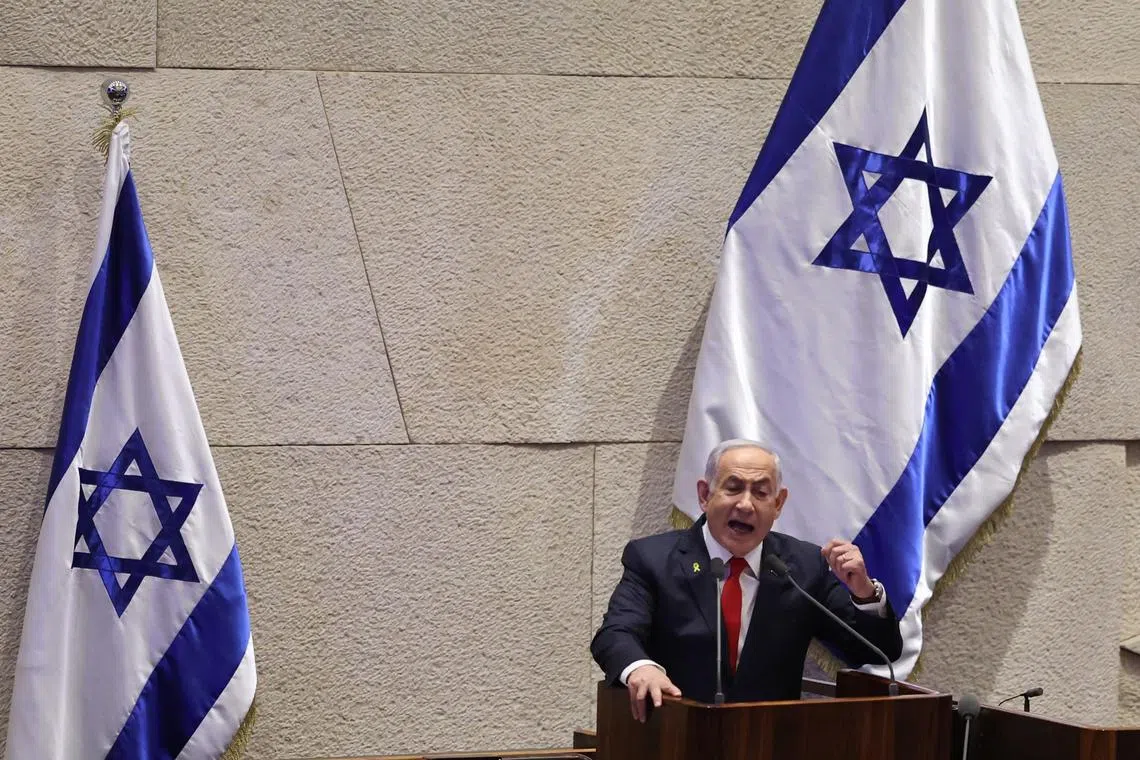Netanyahu offers $6.7m for each hostage freed in Gaza
Sign up now: Get ST's newsletters delivered to your inbox

Israel Prime Minister Benjamin Netanyahu repeated his vow that Israel would hunt down and punish anyone who hurts a hostage.
PHOTO: EPA-EFE
Follow topic:
JERUSALEM - Ceasefire talks to end the fighting in the Gaza Strip are stalled. Casualties in the enclave are mounting.
And families of hostages captured from Israel in the Hamas-led attack that ignited the war have grown increasingly desperate about the plight of their relatives in captivity.
After all the sticks Israel has wielded, it has decided to find out if carrots can make a difference.
Israeli Prime Minister Benjamin Netanyahu on Nov 19 repeated his vow that Israel would hunt down and punish anyone who hurts a hostage, but he added a new promise: Israel will give a generous reward to anyone who returns a captive, paying US$5 million (S$6.7 million) and providing safe passage out of Gaza.
“I want to say to those who are holding our hostages: Whoever dares to harm our hostages will pay the price. We will pursue you, and we will find you,” Mr Netanyahu told Israeli troops on a visit to the Gaza Strip.
“To those who want to leave this entanglement, I say: Whoever brings us a hostage, will find a safe way out for himself and his family,” he added. “We will also give US$5 million for every hostage.”
The reward offer comes as members of Mr Netanyahu’s office face scrutiny for allegedly leaking classified documents to influence public opinion, quell a popular push for a ceasefire that would win the hostages’ release, and promote the prime minister’s negotiating positions.
Many Israelis, including the families of hostages, have accused him of failing to prioritise the release of the captives and prolonging the war to hold together his fragile governing coalition, which includes members who oppose a ceasefire and have threatened to bring down Mr Netanyahu’s government if he agrees to one.
Even some leaders of Israel’s security apparatus – like Mr Yoav Gallant, the defence minister Mr Netanyahu fired
In particular, Mr Netanyahu has set out new conditions after months of talks, like insisting that Israel maintain control of a strip of Gaza along the Egyptian border.
His comments on Nov 19 confirmed Israeli media reports two weeks ago that the government would offer a reward for freed hostages.
It was not clear if the prize he offered would apply to returning the body of a hostage who had died in captivity.
A spokesperson for the Hostages and Missing Families Forum, which has organised weekly protests in Tel Aviv, Israel, for the release of the captives, declined to comment on the offer.
On Nov 18, the group issued a statement addressing ongoing negotiations for a ceasefire between Israel and Hezbollah in Lebanon, demanding that “any effort to reach an agreement with Hezbollah to end the war in Lebanon must explicitly, directly and unequivocally include the immediate release of all hostages in a single deal.”
The group, which represents the relatives of about 100 hostages in Gaza, about one-third of whom are believed by the Israeli authorities to be dead, argued in its statement that the two conflicts – in Gaza and Lebanon – are inextricably linked.
Hezbollah and Hamas are backed by Iran, and Hezbollah began firing across Israel’s northern border in solidarity with Hamas in 2023, prompting Israel to strike back.
The Lebanese militant group had previously pledged that it would only stop fighting when there was a ceasefire deal in Gaza.
In September, Israel sharply escalated its attacks on Hezbollah, and then launched a ground invasion into southern Lebanon
Efforts to halt the two conflicts have diverged.
On Nov 19, a top US envoy to the Middle East, Mr Amos Hochstein, said at a news conference in Beirut that an end to the conflict between Israel and Hezbollah is “within our grasp”.
He is expected to travel on to Israel to continue those discussions.
But a potential agreement would be based on the basic framework of a 2006 United Nations Security Council resolution that quelled hostilities between Israel and Hezbollah previously, and which did not contemplate or address the plight of hostages in Gaza.
Mr Netanyahu insisted on Nov 19 that Hamas would no longer rule Gaza, saying Israel was making progress toward this goal.
But Israeli troops have repeatedly returned to areas of Gaza to fight Hamas militants in places that it has previously said it had cleared.
Fighting in the enclave has displaced about two million people, left much of it in ruins and killed nearly 44,000, according to local health authorities, who do not distinguish between civilians and combatants.
Mr Netanyahu also vowed that Israel would bring back the captives, whether or not Hamas members opt for the reward he offered.
“Choose, the choice is yours, but the result will be the same,” he said. “We will bring them all back.” NYTIMES

